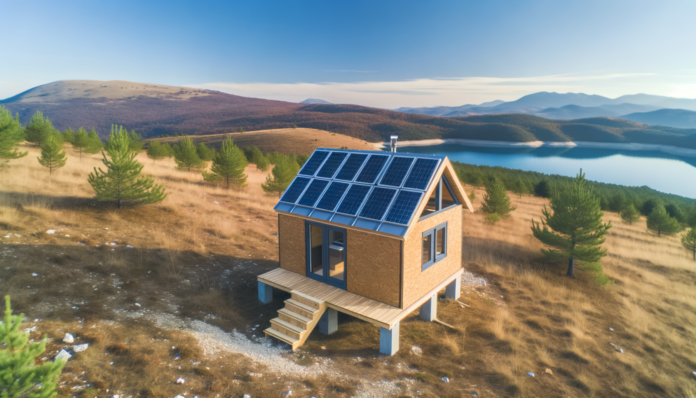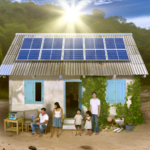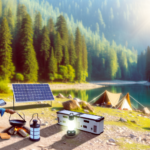Introduction
Overview of Off-Grid Living
Off-grid living is an empowering lifestyle that involves living independently from traditional infrastructures such as electricity grids, water supply systems, and other public utilities. This way of life emphasizes self-sufficiency, sustainability, and a deep connection with nature. By generating their own power, sourcing their own water, and often growing their own food, off-grid enthusiasts aim to minimize their environmental impact while maximizing their personal freedom and resilience. The allure of off-grid living lies in its promise of a simpler, more intentional existence, free from the constraints and stresses of modern urban life.
Importance of Solar Power in Off-Grid Adventures
Solar power plays a crucial role in the success and sustainability of off-grid living. Harnessing the energy of the sun allows individuals and families to generate electricity without relying on fossil fuels or the traditional power grid. This not only reduces their carbon footprint but also provides a reliable and renewable source of energy. Solar power systems, including photovoltaic panels and solar batteries, enable off-grid adventurers to power essential appliances, charge electronic devices, and maintain a comfortable living environment even in remote locations. The portability and scalability of solar technology make it an ideal solution for those seeking to live off the grid, whether they are stationary in a remote cabin or constantly on the move in an RV or sailboat.
Purpose and Scope of the Article
The purpose of this article is to explore the fascinating world of off-grid living through the lens of solar-powered adventures. By sharing real-life stories of individuals and families who have embraced this lifestyle, we aim to inspire and inform readers about the possibilities and benefits of living off the grid. The article will cover various aspects of off-grid living, including its environmental and financial advantages, the sense of self-sufficiency and resilience it fosters, and the spirit of adventure it embodies. Additionally, we will delve into the challenges faced by off-grid enthusiasts and the innovative solutions they employ to overcome them. Finally, we will provide practical tips and insights for those interested in embarking on their own off-grid solar adventure, ensuring they are well-prepared to make the transition successfully.
The Appeal of Off-Grid Living
Environmental Benefits
Living off-grid offers significant environmental benefits, making it an attractive option for those concerned about their ecological footprint. By generating their own power, often through solar panels, off-grid dwellers reduce their reliance on fossil fuels, thereby decreasing greenhouse gas emissions. Additionally, many off-grid homes utilize rainwater catchment systems and composting toilets, which conserve water and reduce waste. This lifestyle encourages a closer relationship with nature, promoting sustainable practices such as organic farming and permaculture. The result is a more harmonious existence with the environment, fostering a sense of responsibility and stewardship for the planet.
Financial Independence
One of the most compelling reasons people choose off-grid living is the potential for financial independence. By producing their own energy and growing their own food, off-grid individuals can significantly reduce their monthly expenses. The initial investment in solar panels and other sustainable technologies can be substantial, but the long-term savings are considerable. Without utility bills, and with a reduced need for groceries and other consumables, off-grid living can free individuals from the financial pressures of modern life. This financial freedom allows for a simpler, more fulfilling lifestyle, unburdened by the constant need to earn and spend.
Self-Sufficiency and Resilience
Off-grid living fosters a sense of self-sufficiency and resilience that is increasingly rare in today’s interconnected world. By learning to generate their own power, manage their own water supply, and grow their own food, off-grid individuals become less dependent on external systems and more capable of handling life’s challenges. This self-reliance builds confidence and resilience, as individuals develop a wide range of practical skills. In times of crisis, such as natural disasters or economic downturns, those living off-grid are often better prepared to weather the storm, having already established a sustainable and independent way of life.
Adventure and Exploration
For many, the allure of off-grid living lies in the adventure and exploration it offers. Living off the beaten path provides a unique opportunity to reconnect with nature and experience the world in a more intimate and meaningful way. Whether it’s hiking through remote wilderness, sailing the open seas, or building a cabin in the mountains, off-grid living is often synonymous with adventure. This lifestyle encourages exploration, not just of the natural world, but also of one’s own capabilities and limits. The challenges and rewards of off-grid living create a sense of accomplishment and fulfillment that is hard to find in conventional living.
In summary, the appeal of off-grid living is multifaceted, encompassing environmental benefits, financial independence, self-sufficiency, and a spirit of adventure. This lifestyle offers a path to a more sustainable, fulfilling, and resilient way of life, making it an increasingly popular choice for those seeking to escape the constraints of modern society.
Real-Life Solar Adventure Stories
A Family’s Journey Across America
Imagine a family of four, traveling across the vast landscapes of America in their renovated 2001 Airstream Travel Trailer. Known as “Stranded ‘n’ Paradise,” this family has embraced the off-grid lifestyle, thanks to a robust solar power system. They spend 4 to 6 months each year exploring regions like the Pacific Northwest and the Rocky Mountains, all while being completely energy independent. Their Airstream is equipped with a 100% pure Renogy Solar and LiFePO4 system, which includes 900 watts of roof solar panels and 600AH of lithium battery storage. This setup allows them to boon-dock in National Parks and public lands without sacrificing the comforts of home. Their adventures have taken them to incredible places like North Cascades National Park and Glacier National Park, where they can disconnect from shore power and immerse themselves in nature.
Solo Hiker’s Experience in the Appalachian Trail
For solo hiker Emily, the Appalachian Trail was not just a journey through nature but a test of self-sufficiency. Armed with portable solar panels and a lightweight battery pack, Emily was able to keep her essential devices charged throughout her trek. Her solar setup included a foldable 100-watt solar panel and a 20,000mAh battery pack, which she used to power her GPS, phone, and headlamp. This allowed her to navigate the trail safely and stay connected with loved ones. Emily’s experience highlights the importance of reliable solar power in remote and challenging environments, proving that even solo adventurers can thrive off-grid.
Sailing the Seas with Solar Power
Captain John and his crew have been sailing the high seas for years, but it wasn’t until they installed a solar power system on their sailboat that they truly felt free. Their boat is now equipped with 400 watts of solar panels and a 200AH lithium battery bank, which powers everything from navigation systems to refrigeration. This setup has allowed them to anchor in remote bays and explore uninhabited islands without worrying about running out of power. The solar system has also reduced their reliance on diesel generators, making their voyages more eco-friendly and cost-effective. For Captain John, solar power has transformed sailing from a hobby into a sustainable lifestyle.
Remote Cabin Living in the Rockies
In the heart of the Rocky Mountains, the Smith family has built a life of self-sufficiency in their remote cabin. Their off-grid home is powered entirely by a solar energy system that includes 1,200 watts of solar panels and a 1,000AH battery bank. This setup provides enough energy to power their lights, appliances, and even a small workshop. During the winter months, when sunlight is scarce, they rely on a backup generator and a wood stove for heat. The Smiths have also implemented a rainwater catchment system and a composting toilet to further reduce their environmental impact. Their journey to off-grid living has been filled with challenges, but the rewards of independence and sustainability make it all worthwhile.
These real-life stories showcase the diverse ways in which solar power can enable off-grid adventures. Whether traveling across America, hiking the Appalachian Trail, sailing the seas, or living in a remote cabin, solar energy provides the freedom and sustainability that modern adventurers crave.
Challenges and Solutions
Weather and Climate Considerations
Living off-grid with solar power means being at the mercy of the weather. **Cloudy days, heavy rain, and snow** can significantly reduce the efficiency of solar panels. To mitigate these issues, it’s crucial to install panels at optimal angles and ensure they are free from obstructions like snow or debris. Additionally, having a backup energy source, such as a generator, can provide power during extended periods of poor weather.
Energy Storage and Battery Management
One of the most critical aspects of off-grid solar living is **energy storage**. Batteries store the energy generated by solar panels for use when the sun isn’t shining. However, managing these batteries can be challenging. Overcharging, deep discharging, and temperature extremes can all reduce battery lifespan. To address these issues, invest in high-quality batteries and a reliable battery management system (BMS). Regular monitoring and maintenance are also essential to ensure longevity and efficiency.
Maintenance and Durability
Solar panels and their associated systems require regular maintenance to function optimally. **Dust, dirt, and bird droppings** can accumulate on panels, reducing their efficiency. Regular cleaning and inspections are necessary to keep the system running smoothly. Additionally, components like inverters and batteries have limited lifespans and will need replacement over time. Investing in durable, high-quality equipment and setting up a maintenance schedule can help mitigate these challenges.
Cost and Accessibility
The initial investment for an off-grid solar system can be substantial. **Solar panels, batteries, inverters, and installation costs** can add up quickly. However, there are ways to make this more affordable. Look for financial incentives, tax credits, and rebates that can offset some of the costs. Additionally, consider starting with a smaller system and gradually expanding it as your budget allows. Accessibility can also be an issue, especially in remote areas. Partnering with local suppliers and installers can help ensure you get the support you need.
By understanding and addressing these challenges, you can make your off-grid solar adventure more sustainable and enjoyable.
Technological Innovations in Solar Power
Portable Solar Panels
Portable solar panels have revolutionized the way adventurers harness solar energy. These lightweight, foldable panels are designed for easy transport and quick setup, making them ideal for camping, hiking, and other off-grid activities. **Portable solar panels** can be used to charge small devices like smartphones, GPS units, and portable batteries, ensuring that you stay connected and powered up even in remote locations. Brands like Renogy and Goal Zero offer a range of portable solar solutions that cater to different power needs and budgets.
Solar-Powered Gadgets and Appliances
The market for solar-powered gadgets and appliances has expanded significantly, offering a variety of tools that enhance the off-grid living experience. From solar-powered lanterns and cookers to water purifiers and refrigerators, these devices are designed to operate efficiently using solar energy. **Solar-powered gadgets** not only reduce reliance on traditional power sources but also contribute to a more sustainable lifestyle. For instance, solar cookers can prepare meals without the need for gas or electricity, while solar water purifiers ensure access to clean drinking water in remote areas.
Advancements in Battery Technology
One of the most critical components of any solar power system is the battery. Recent advancements in battery technology have made it possible to store more energy in smaller, more efficient units. **Lithium-ion batteries**, in particular, have become the standard for off-grid solar systems due to their high energy density, long lifespan, and relatively low maintenance requirements. Innovations like the Tesla Powerwall and Renogy’s LiFePO4 batteries offer robust energy storage solutions that can power homes, RVs, and boats for extended periods, even during cloudy days or at night.
Smart Solar Systems and Monitoring
The integration of smart technology into solar systems has made it easier than ever to monitor and manage energy consumption. **Smart solar systems** come equipped with advanced monitoring tools that provide real-time data on energy production, storage, and usage. These systems can be controlled remotely via smartphone apps, allowing users to optimize their energy consumption and troubleshoot issues from anywhere. Products like the Renogy One Core offer comprehensive monitoring capabilities, ensuring that your solar setup operates at peak efficiency and providing peace of mind for off-grid adventurers.
In conclusion, technological innovations in solar power are making off-grid living more accessible, efficient, and enjoyable. From portable solar panels and solar-powered gadgets to advanced batteries and smart monitoring systems, these advancements empower individuals to explore the world sustainably and independently.
Tips for Successful Off-Grid Solar Living
Planning and Preparation
Embarking on an off-grid solar adventure requires meticulous planning and preparation. Start by assessing your energy needs. Calculate the total wattage of all the appliances and devices you plan to use. This will help you determine the size and number of solar panels and batteries required. Research local weather patterns to understand the amount of sunlight your location receives throughout the year. This information is crucial for designing an efficient solar system. Additionally, familiarize yourself with local regulations and building codes to ensure compliance.
Choosing the Right Equipment
Selecting the appropriate equipment is vital for a successful off-grid solar setup. **Solar panels** are the heart of your system, so invest in high-quality, efficient panels. **Monocrystalline panels** are known for their efficiency and durability, making them a popular choice. **Inverters** convert the DC power generated by the panels into AC power for your appliances. Choose an inverter that matches your power needs and has a good efficiency rating. **Batteries** store the energy for use when the sun isn’t shining. **Lithium-ion batteries** are preferred for their long lifespan and efficiency. Don’t forget to include a **charge controller** to regulate the power going into the batteries, preventing overcharging and extending battery life.
Installation and Setup
Proper installation and setup are crucial for the efficiency and safety of your solar system. Begin by positioning your solar panels in an area that receives maximum sunlight, typically facing south in the northern hemisphere. Ensure they are tilted at an angle that optimizes sun exposure throughout the year. Secure the panels firmly to withstand weather conditions. Connect the panels to the charge controller, then to the batteries, and finally to the inverter. It’s advisable to consult with or hire a professional for the electrical connections to ensure safety and compliance with local codes. Once everything is connected, test the system to ensure it’s working correctly.
Maintenance and Troubleshooting
Regular maintenance is essential to keep your off-grid solar system running smoothly. **Clean the solar panels** periodically to remove dust, dirt, and debris that can reduce efficiency. Inspect the panels and connections for any signs of wear or damage. **Monitor the battery levels** and ensure they are not being overcharged or deeply discharged, as this can shorten their lifespan. Use a **Kill-a-watt meter** to track the energy consumption of your appliances and make adjustments as needed. In case of any issues, refer to the manufacturer’s troubleshooting guide or seek professional assistance. Keeping a log of your system’s performance can help identify patterns and potential problems early.
By following these tips, you can ensure a successful and sustainable off-grid solar living experience. Proper planning, choosing the right equipment, careful installation, and regular maintenance will empower you to live independently and sustainably.
Conclusion
Recap of Key Points
As we draw this exploration of off-grid living and solar-powered adventures to a close, it’s essential to revisit the key points that have been discussed. Off-grid living offers numerous benefits, including environmental sustainability, financial independence, self-sufficiency, and the thrill of adventure. Real-life stories from families, solo hikers, sailors, and remote cabin dwellers have illustrated the transformative power of solar energy in enabling these off-grid lifestyles. However, challenges such as weather variability, energy storage, maintenance, and costs must be navigated with thoughtful solutions. Technological innovations in portable solar panels, solar-powered gadgets, advanced batteries, and smart monitoring systems are making off-grid solar living more accessible and efficient than ever before. Finally, practical tips on planning, equipment selection, installation, and maintenance can help aspiring off-grid adventurers embark on their journeys with confidence.
Encouragement for Aspiring Off-Grid Adventurers
For those contemplating the leap into off-grid living, let these stories and insights serve as both inspiration and guidance. The path to self-sufficiency and independence is not without its hurdles, but the rewards are immeasurable. Imagine waking up to the sound of nature, relying on your ingenuity to solve problems, and experiencing the profound satisfaction of living sustainably. Whether you dream of traversing the country in a solar-powered RV, hiking remote trails with a solar backpack, or settling into a secluded cabin, the possibilities are endless. The key is to start small, plan meticulously, and embrace the learning curve. Remember, every challenge overcome is a step towards a more empowered and fulfilling life.
Future of Solar Power in Off-Grid Living
The future of solar power in off-grid living is bright and full of promise. As technology continues to advance, solar solutions are becoming more efficient, affordable, and user-friendly. Innovations in energy storage, such as high-capacity batteries and smart grid systems, are addressing one of the most significant challenges of off-grid living—reliable energy supply. Portable solar panels and solar-powered appliances are making it easier for adventurers to harness the sun’s energy wherever they go. Moreover, the growing awareness and commitment to environmental sustainability are driving more people to consider off-grid living as a viable and responsible lifestyle choice. As we look ahead, it’s clear that solar power will play a pivotal role in shaping the future of off-grid living, enabling more people to live independently and harmoniously with nature.
In conclusion, the journey to off-grid living, powered by solar energy, is one of empowerment, resilience, and adventure. By embracing the sun’s abundant energy, we can create a sustainable and fulfilling way of life that reconnects us with the natural world. So, whether you’re just starting to explore this lifestyle or are already on your off-grid journey, let the stories and insights shared in this article inspire and guide you towards a brighter, solar-powered future.




